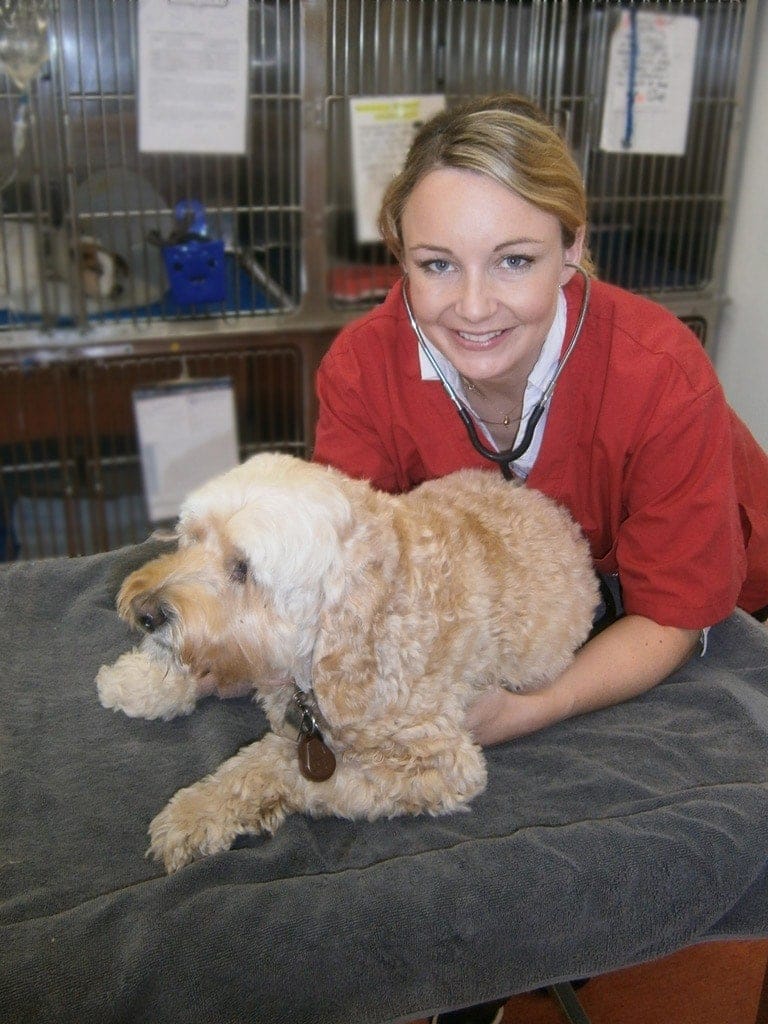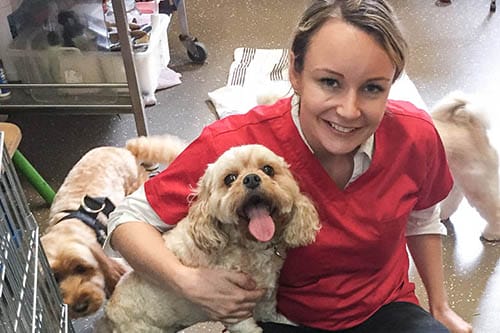We have been lucky enough to team up with Dr Abbie Tipler from Mosman Vet to create a new section that will help you answer health questions you might have about your dog. So let’s get straight into it with some information on vomiting in dogs.
1. What are some of the reasons dogs vomit?
The list of things that can make dogs vomit is endless, however by far the most common cause we see in general practice is ‘dietary indiscretion’. This is just a fancy way of saying your dog has eaten something he shouldn’t have!
Our main concern in these cases is often whether the unusual ‘snack’ could get stuck in the intestines. Most vets will be able to spin a good yarn about the things they have removed from the bowels of dogs. Textile objects (like a sock) are a big risk for an obstruction as they aren’t broken down in the stomach. Bones are a less common cause of obstruction, but are still seen relatively frequently.
However, a lot of vomiting dogs that have eaten something naughty do not have an obstruction. In these cases the cause of vomiting is often gastroenteritis, which is inflammation of the gastro-intestinal system. These cases are usually not serious and can be treated by addressing the dehydration caused by fluid loss and feeding the poorly pooch some easily digested food for a few days.
Other causes of vomiting include (but are by no means limited to) kidney, liver or cardiac disease, metabolic or endocrine disease (eg. diabetes), toxins, inflammatory bowel disease, tick paralysis, cancer and gastro-intestinal parasitism.
2. What should you do after your dog has vomited?
If your dog has just had a one-off vomit but is otherwise happy, bright and maintains good appetite, then this is less of a worry. In these situations, it is a good idea to hold off food for 24 hours to allow the tract to settle and then follow this by feeding something bland like cooked chicken breast (no skin) and white rice. This combination is very easily digested by the gastro-intestinal system and helps to calm down the inflamed bowel.
It is very important that if your dog vomits several times, or he/she is lethargic, off food or seems to have recently lost weight, that you call your vet. Your Veterinary clinic personnel will then ask some more questions to determine whether you should bring your dog into the clinic. Often, it is wise to have a check up so that the vet can examine your dog. They will feel his or her belly to check for obstructions, check for other possible masses, and will also look for weight loss, fever, irregular heart beats, dehydration and changes to colour. It is important to realise that vomiting in a dog is never normal, although it’s often not serious. Any cause of vomiting is best diagnosed and treated early.
 Your veterinarian may ask the following questions (so have the answers handy).
Your veterinarian may ask the following questions (so have the answers handy).
- How many times has he/she vomited?
- Is there any diarrhoea? (check the backyard; you may also find more vomitus, or better still, evidence of things possibly ingested!)
- Is he/she up to date with worming and tick medications?
- Has there been any possible exposure to toxic substances, for example slug or snail bait, rat bait poison, or anything considered non-edible?
- Is he/she a scavenger ie. likely to go through the bin, pick up odd things on walks etc.?
- Have you noticed any weight loss? Your veterinarian may have a record of your dog’s last weight to compare to.
- Are there any other symptoms? e.g. anorexia (off food), lethargy (not as active as normal), not wanting to exercise, coughing.
3. Since a little vomiting can be normal in dogs when do you know you should take your dog to the vet?
In summary, if your dog:
a) Has vomited more than once OR
b) Is exhibiting other symptoms eg. lethargy, off their food etc.
At the very least a phone call should be made to the vet to ask for advice. They will likely gather more information to determine if the vomiting is likely to be serious (including the questions above, so have the answers to hand).
If your dog:
a) Has vomited several times OR
b) Has not produced faeces in a couple of days or has produced large amounts of diarrhoea OR
c) Has been losing weight prior to the onset of vomiting OR
d) Has had exposure to something toxic OR
e) Has eaten something non-digestible i.e. textiles-based
then you should book an appointment to see the vet.
If your dog:
a) Is crying or exhibiting signs of pain OR
b) Is very lethargic or collapsed OR
c) Is pale in colour OR
d) Is having difficulty breathing OR
e) Appears to have bloating of the abdomen
then you should take them to the clinic immediately.
These are general rules of thumb, if there is any doubt, phone your vet clinic for advice.
4. Do puppies and old dogs vomit more often?
Vomiting is a very common reason for a pet to visit the vet clinic. The reasons we see puppies vomiting can be quite different from older dogs. Younger dogs are more likely to eat naughty things like toys, socks, and undies, whereas older dogs presenting for vomiting would raise a few more concerns about general health. In their case we would often like to make an assessment of kidney, heart and liver function, and check for signs and symptoms of cancer.
5. Do dogs eat grass to make themselves vomit?
Most dogs that eat grass are perfectly healthy and it can be a normal behaviour to eat grass (and only in some cases will the dog vomit it up afterwards). Whether dogs eat grass to actually make themselves vomit is unknown and still under debate! There can be other causes of grass eating such as boredom, lack of fibre in the diet and simply because he/she likes the taste. Be careful of dogs eating grass that has a sticky surface, as this can clump in the stomach an lead to an obstruction.
Please note: Puppy Tales provides these articles for information purposes only. For any health problems with your pet always seek immediate veterinary advice from your local veterinarian.

Dr Abbie Tipler, BVSc, MACVS (Surgery)
Dr Abbie is a Small Animal Veterinarian with 10 years full-time experience. Her passion is Small Animal Surgery and in 2011 she studied towards and obtained her Memberships in Small Animal Surgery from the Australian College of Veterinary Scientists. Although surgery is her special interest, she loves all aspects of General Practice, especially canine medicine. She lives with her family and two Ragdoll cats.


